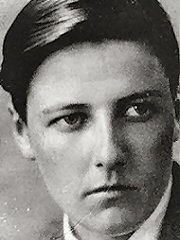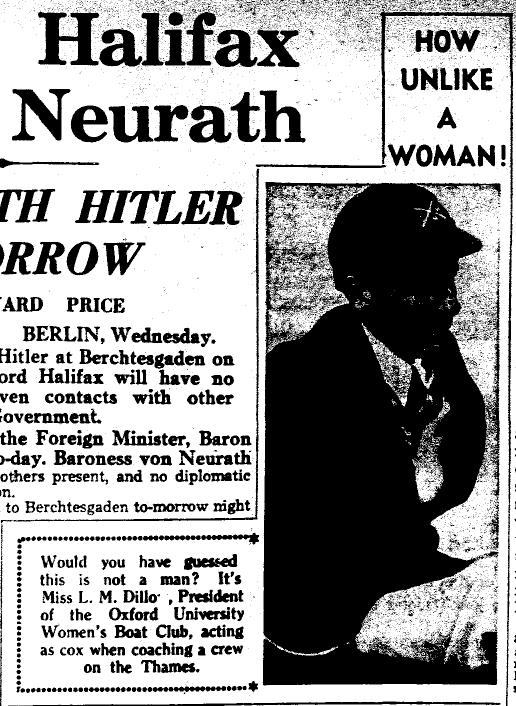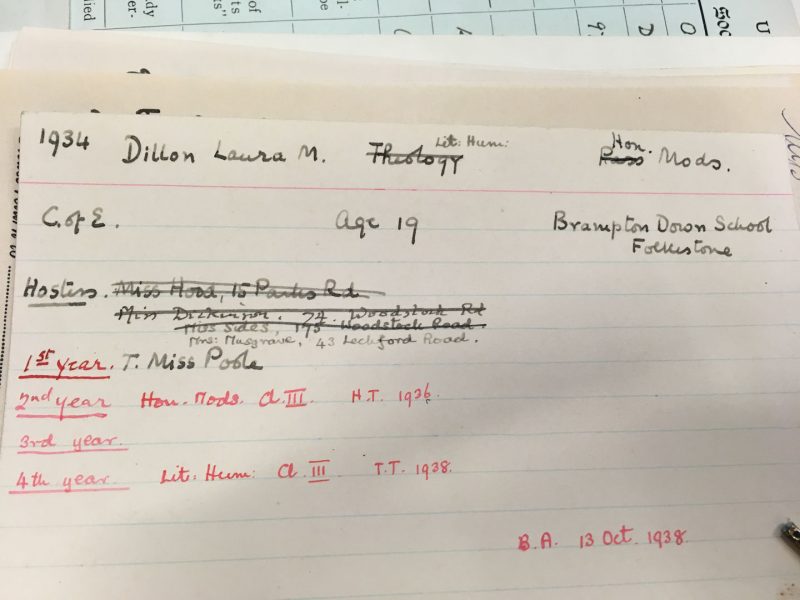(Laurence) Michael Dillon, born Laura Maude Dillon, was the first person in the UK to undergo hormone treatment and surgery for a female to male transition between 1939 and 1949. He attended The Society of Oxford Home-Students (now St Anne’s College) from 1934 to 1938.
This blog post draws heavily on the Oxford chapter of Dillon’s autobiography ‘Out of the Ordinary’. Dillon is referred to as ‘he’ in this post although his treatments took place after leaving Oxford.

Dillon won an entrance at both St Hugh’s and the Society of Home-Students. He had no scholarship and only a small income inherited from his father which was topped up by the generosity of the aunts he lived with. As a non-collegiate society, the Home-Students offered a cheaper path to Oxford and it was here that Dillon elected to enrol. At the time, the Society centred around Musgrave House on Parks Road, where the Principal and tutors had rooms, and Jowett Walk, where a University building was rented as an administrative and library space. Buildings on the Woodstock Road site where St Anne’s resides today had been acquired but work on Hartland House wasn’t finished until the end of Dillon’s time in Oxford.
Dillon had initially entered to read for the Pass School in Theology but later switched to Honours in Literae Humaniores (Classics or ‘Greats’). The Honours course required a good deal more Latin and Greek than Dillon had, his classical education to this point having been very rudimentary. He remarks in his autobiography that catching up to the necessary level seemed an “impossible undertaking”. Nevertheless he began taking tutorials and brushing up what little Greek and Latin he remembered from school. Happily, an old tutor from his school days offered to coach him for free during the vacations.
From the moment he arrived in Oxford, Dillon was increasingly uncomfortable dressing in the clothing expected of him and attending gatherings populated by “politely condescending” young men. He writes that in Oxford one can be “social, athletic or studious” but not all three. Feeling that the social option was closed to him, Dillon poured his efforts into sport and study. He took up rowing in his first term and by his second year was ‘stroking’ (rowing at the stern— one of the most competitive positions). He became a rowing Blue in his second year and was made president of the Oxford University Women’s Boat Club. In his first year, conventional side-by-side rowing was thought to be too dangerous for women and they raced at staggered, timed, intervals instead. There was no uniform and races lasted only half a mile, always downstream.
Once elected president, Dillon set about a programme of reform. He found a coach for the team and made sure that they were able to race side by side. The following year, the race was extended to a mile and went upstream. His efforts were well supported by fellow students and Dillon recalls riverbanks lined with cheering men and women and much acclaim in the Sunday papers. Smart uniforms with their logo and lettering also helped the O.U.W.B.C. to be seen as a more serious enterprise. Dillon wrote to the Principal of the Home-Students, asking that the women’s colleges consider allowing more than just the eights team to race but had his request turned down. In his fourth and final year, 1938, the O.U.W.B.C. won their races against Cambridge, London, Kings, Bristol and Edinburgh.

Academically, Dillon continued with the classics and took options in Logic and Greek Drama as part of Greats. The Society of Home-Students’ non-collegiate nature meant that many of the students went to tutors from other colleges and so Dillon had contact with more male tutors than he might have had at another of the women’s colleges/societies. For Logic, he went to a tutor at Brasenose called J. I. McKie, who became a lifelong friend. Philosophy was of great interest to Dillon as someone who enjoyed debating and had undoubtedly done more soul searching than many of his undergraduate cohort. His Hilary Term report of 1938 describes his “unfortunate combination of bad eyesight and bad Greek” and goes on to say that his “performance in Schools will be quite the wildest gamble within my experience”. Many of his tutors reported a similar unpredictability about Dillon.
During his first term, Dillon had confided in a Fellow and at least one student of his discomfort at being treated as a woman. Those in whom he confided unanimously suggested that a repressed homosexuality was to blame, a diagnosis which Dillon was unconvinced by. Two friends of his age at Oxford were a man called Bill from Teddy Hall who used to sneak Dillon in to watch University boxing matches (then forbidden to women) and an unnamed female friend “who was in many respects similar to myself”. The female friend and he took boxing lessons together and rowed from Oxford to Putney one vacation.
Dillon’s student file carries an undated letter addressed to Grace Hadow (the Principal), likely written just before he left Oxford. He had, on Grace Hadow’s recommendation, been to meet Dr Zuckerman (later Baron Zuckerman) to discuss the study of anatomy. The letter enthusiastically explains Zuckerman’s research including injecting male and female hormones into rats and monitoring their behaviour.
Dillon graduated in 1938 with the Third Class Honours he had predicted himself and bought a motorcycle that summer, impressing the men at the garage with how quickly he took to it. His name (as L.M.Dillon) appears in the 1939 issue of The Ship with news of his new appointment as ‘Laboratory Assistant, Stoke Park Colony, Stapleton, Bristol’ where his work would involve dissecting brains.
He reportedly loved Oxford from the start of his time here and had many fond memories, but distancing himself from his former life was an essential part of becoming who he wanted to be. At Oxford there had been young women who had dressed similarly to him and had their hair cut short but, outside of the University bubble, Dillon was set for a life of discomfort and unwanted attention.

After Oxford, Dillon worked as a lab technician and then as a mechanic in Bristol, where he also began an experimental course of testosterone. It wasn’t long before he was able to pass more easily as a man and by the time he entered Trinity College Dublin to study medicine in the 1940s, he had had a double mastectomy and a phalloplasty. Dillon had coached the women’s rowing club at Bristol University and when he moved to Dublin rowed ‘stroke’ again at Trinity College, this time for the men’s team.
After qualifying as a physician, he worked in a Dublin hospital for a number of years and then on board a merchant navy vessel. Despite his best efforts, unwanted attention was drawn to his sex change after newspapers spotted discrepancies in how he was referred to in Debrett’s Peerage and Burke’s Peerage; one mentioning him as a sister, and the other as a brother. Abandoning his post at a port in India, Dillon sought out a Buddhist community and ultimately ordination. When he died of an unexplained illness in 1962, he had become a novice in the Theravadin order of the Hinayana school (the first Westerner to do so) and changed his name to Lobzang Jivaka.
Books by or about Michael Dillon / Lobzang Jivaka in St Anne's College Library:
- Dillon, Michael, Self : a study in ethics and endocrinology, [1946] London : William Heinemann (https://solo.bodleian.ox.ac.uk/permalink/44OXF_INST/k30gf0/alma990128169330107026)
- Dillon, Michael, Poems of truth, [1957] London : Linden Press (https://solo.bodleian.ox.ac.uk/permalink/44OXF_INST/k30gf0/alma990113971860107026)
- Jivaka, Lobzang, Imji getsul : an English Buddhist in a Tibetan monastery, [1962] London : Routledge and Kegan Paul (https://solo.bodleian.ox.ac.uk/permalink/44OXF_INST/k30gf0/alma990113971730107026)
- Jivaka, Lobzang, The life of Milarepa, Tibet’s great Yogi, [1962] London : John Murray (https://solo.bodleian.ox.ac.uk/permalink/44OXF_INST/k30gf0/alma990123306540107026)
- Dillon, Michael, Out of the ordinary : a life of gender and spiritual transitions, [2017] New York : Fordham University Press (https://solo.bodleian.ox.ac.uk/permalink/44OXF_INST/k30gf0/alma990214243560107026)
- Hodgkinson, Liz, Michael, née Laura, [1989] London : Columbus Books (https://solo.bodleian.ox.ac.uk/permalink/44OXF_INST/k30gf0/alma990103939180107026)